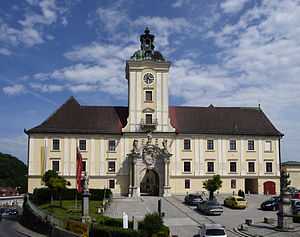Lambach Abbey

Lambach Abbey (German: Stift Lambach) is a Benedictine monastery in Lambach in the Wels-Land district of Upper Austria, Austria.
History
A monastery was founded in Lambach in about 1040 by Count Arnold II of Lambach-Wels. His son, Bishop Adalbero of Würzburg (later canonised), changed the monastery into a Benedictine abbey in 1056, which it has been since. During the 17th and 18th centuries a great deal of work in the Baroque style was carried out, much of it by the Carlone family.
Lambach escaped the dissolution of the monasteries of Emperor Joseph II in the 1780s. It was however dissolved by the National Socialists in 1941, in the Operation Klostersturm, and the premises were used for the accommodation of a Nazi school and training institution. The Benedictines were exiled or taken for forced labour. The dispossessed monastic community returned to Lambach Abbey after the end of World War II.[1]
Cultural features

The abbey has preserved much of cultural interest. It contains the oldest extant Romanesque frescoes in Southern Germany and Austria, and the former abbey tavern, now a pharmacy, with a beautiful Baroque façade. The abbey's Baroque theatre has also been restored to working order and the summer refectory from the early 18th century by Carlo Antonio Carlone has been converted into a concert hall. The ambulatory by Diego Carlone from the same period is of great magnificence. An unexpected feature is the set of Baroque dwarves in the monastery garden (see also Gleink Abbey).
The abbey church was also refurbished in the Baroque style, with an organ by Christoph Egedacher and contains the tomb of Saint Adelbero. The abbey also possesses the medieval St. Adelbero's Chalice, although it is rarely on view to the public, besides a large collection of sacred art. The library was constructed about 1691 and contains approximately 50,000 volumes as well as archive material.
Since 1625 the abbey has belonged to the Austrian Congregation, which now forms part of the Benedictine Confederation.
Notes
- ↑ In 1897/98 Adolf Hitler lived in the town of Lambach with his parents. It is often claimed that he attended the secular Volksschule at which Benedictine teachers were employed, but also that he attended the monastery school, where each day he saw swastikas among the carved stones and woodwork, which included the symbol.("Nazi Party is Formed" - "The History Place")
External links
- Lambach Abbey website (German)
Coordinates: 48°05′27″N 13°52′38″E / 48.09083°N 13.87722°E